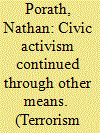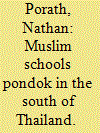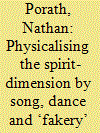| Srl | Item |
| 1 |
ID:
099659


|
|
|
|
|
| Publication |
2010.
|
| Summary/Abstract |
This article explores the relationship between civil society and terror-violence. It argues that terrorism should be understood as "civic activism continued through other means." This allows us to distinguish it from state-terror. The article then explores the theme with data drawn from the political situation in the south of Thailand focusing on some recent events in which local Thai Malay-Muslims have protested against military presence. The paper also provides a brief history of the development of belligerent separatist groups in the area showing that they emerged after dissatisfaction with 20th century Thai civil-societal possibilities.
|
|
|
|
|
|
|
|
|
|
|
|
|
|
|
|
| 2 |
ID:
154720


|
|
|
|
|
| Summary/Abstract |
At the turn of the millennium, inhabitants of a small Karen village situated in one of Thailand’s UNESCO World Heritage Sites sought access to environmental justice in the Thai courts over industrial pollution that had contaminated their local stream with lead and caused them years of degraded health and social misery. The Karen villagers were only able to gain access to justice with the help of NGOs that served them as a support group during a period when Thailand was experiencing active civil and democratic awakening. The NGOs, which had a common cause with the Karen villagers, helped them enter the ‘environmental justice frame’ and its discourse. Their experience of lead pollution was framed within a moral ‘rhetoric of exposure’, which came to guide their activism against intransigent agencies and policies, as well as their mobilization for access to justice.
|
|
|
|
|
|
|
|
|
|
|
|
|
|
|
|
| 3 |
ID:
135002


|
|
|
|
|
| Summary/Abstract |
This paper focuses on the ponoh/pondok Muslim schools of the south of Thailand. These schools, which are traditional institutions of religious learning and places of religious piety, have experienced conflict and contestations throughout the twentieth century. Pondok have been pulled by different modernizing forces including separatist violence. The paper concludes that the contestations and negotiations with the Thai government are about the development of the local Malay people's modern civic identity within Thailand. It suggests that the introduction of a secular curriculum has had (and still has) its benefits for empowering the Malay-speaking population by supplying them with the cultural tools to contest and civically negotiate their position, culture and heritage within the Kingdom. The paper also provides a history of these schools and their political relationship to the Thai government's policies and to separatist organizations, as well as an update of events relating to the schools during the recent period of separatist and counter-separatist activities.
|
|
|
|
|
|
|
|
|
|
|
|
|
|
|
|
| 4 |
ID:
142501


|
|
|
|
|
| Summary/Abstract |
The Orang Sakai of Mainland Riau, on the east coast of Sumatra, have an elaborate performing art genre through which they physicalise the unseen spirit-dimension in a shamanic ritual called dikei. Their shamanic ritual utilises songs, dance as well as comedy. This article elaborates on how songs and dance visualise the unseen beings and provides detailed examples of Sakai performances during which shamans ‘dance with’ or ‘move with’ the spirits. A second theme of the article is the question of the relationship between the meaning of ‘performance’ and fakery, and suggests that there are three types of performed fakery, two of which are accepted as valid and necessary performances which technically contribute to the performance of medicine and the physicalisation of spirit presence.
|
|
|
|
|
|
|
|
|
|
|
|
|
|
|
|
| 5 |
ID:
095565


|
|
|
|
|
| Publication |
2010.
|
| Summary/Abstract |
This paper is ethnographically concerned with two different orang asli communities: the Meniq living in Southern Thailand and the Orang Sakai in Riau, Indonesia. The focus is on the different discursive rhetorics of development in the two nation-states. These rhetorics have been absorbed by the two indigenous groups to form part of their own modern cultural discourses within their respective countries. These rhetorics of development define the indigenous groups as somewhat lacking in culture and provide them with new understandings of themselves that devalue their customary way of life. The post-development indigenous identity work (such as the development of an ethno-cultural identity) will therefore usually be constructed through these negated developmental foundations.
|
|
|
|
|
|
|
|
|
|
|
|
|
|
|
|